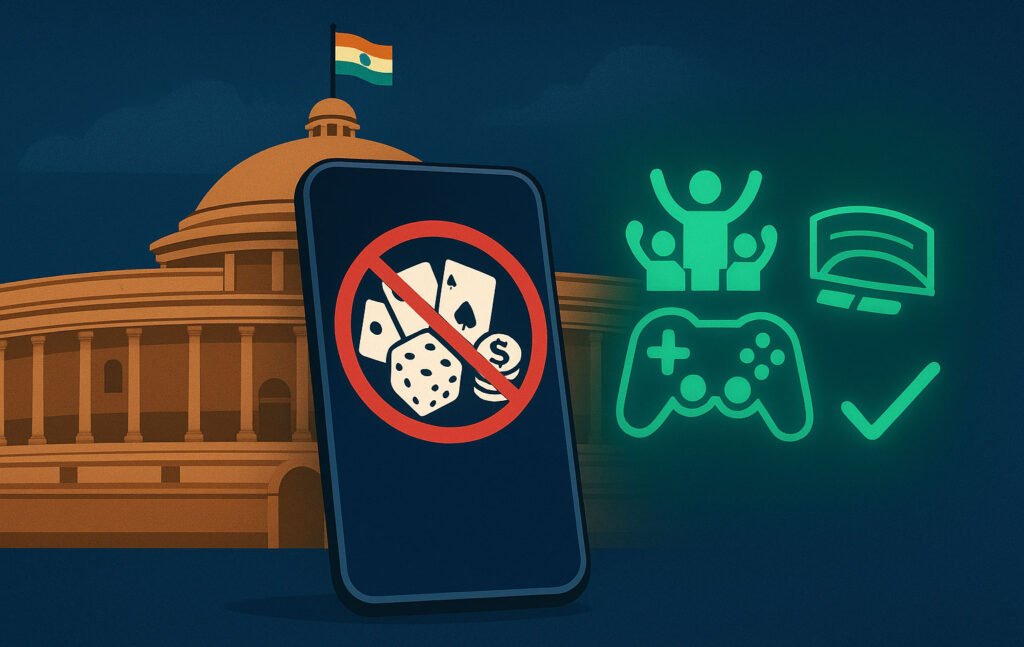The Lok Sabha has passed the Promotion and Regulation of Online Gaming Bill, 2025, a comprehensive legislation intended to prohibit online money games and regulate permissible online gaming activity in India. Introduced by Union Minister for Electronics and Information Technology, Ashwini Vaishnaw, the Bill represents a significant legislative intervention in the fast-expanding online gaming sector, balancing concerns of addiction, economic exploitation, and national security with the promotion of legitimate e-sports and social gaming. Let’s know why this bill is required.
The Bill was required because:
- Existing state gambling laws were outdated and fragmented.
- The skill-chance loophole allowed money games to thrive unchecked.
- Online gaming addiction was causing grave social and financial harm.
- Platforms were linked to fraud, money laundering, and even terror financing.
- India needed a uniform central framework to regulate and promote safe gaming while protecting citizens and national security.
Statutory Definition of ‘Online Money Game’
The Bill provides a wide definition of “online money game.” Under Section 2(h), it covers:
- Any game played online (whether based on skill, chance, or both).
- Games where participation requires payment of a fee, deposit of money, or any stake.
- Games where the expectation of monetary or equivalent enrichment exists.
Exclusion: The definition expressly excludes e-sports, which are carved out as a separate category for recognition and promotion.
This broad statutory definition indicates legislative intent to avoid the traditional skill-versus-chance debate, and instead treat any monetised gaming model as prohibited if linked to wagering or financial stakes.
Penal Consequences
The Bill prescribes strict penal provisions for both service providers and promoters:
- Service providers: Offering an “online money gaming service” in violation of the Act may result in up to 3 years imprisonment, a fine of up to ₹1 crore, or both.
- Advertisement and promotion: Engaging in advertising such services may attract up to 2 years imprisonment, a fine of up to ₹50 lakh, or both.
These provisions create dual liability—one for direct operators and another for those enabling dissemination—reflecting a policy stance against not just the games, but also their ecosystem of promotion and facilitation.
Regulatory Authority and Investigative Powers
The Bill mandates the establishment of a Central Regulatory Authority, which may suo motu determine whether a game constitutes an “online money game.”
Key powers include:
- Wide investigative powers to appointed officers, including the authority to arrest and conduct searches without a warrant upon “reasonable suspicion.”
- Ability to recommend blocking of information relating to online money gaming under the IT Act, 2000 framework, extending jurisdiction to both domestic and foreign-based operators targeting Indian users.
This framework reflects a hybrid regulatory-cum-enforcement model, blending administrative oversight with criminal investigative powers, an unusual but deliberate choice in tech regulation.
Carve-Out for E-Sports and Social Games
While prohibiting online money games, the Bill simultaneously seeks to promote legitimate gaming avenues:
- E-Sports
- Defined as organized, competitive multiplayer games.
- Outcomes must depend on skill factors such as physical dexterity, strategic thinking, or mental agility.
- Recognized under the National Sports Governance Act, 2025.
- May allow entry/administrative fees and prize money, but explicitly excludes betting or wagering.
- Online Social Games
- May be promoted for educational or recreational purposes.
- Permitted to charge subscription fees.
- Strictly barred from offering wagering/betting elements.
This carve-out is significant—it reflects legislative intent to distinguish between exploitative gambling models and skill-based recreational competition, thereby preserving innovation while safeguarding public interest.
Legislative Rationale
The Statement of Objects and Reasons provides an extensive policy justification:
- Socio-economic harms: Proliferation of online money games has resulted in compulsive behaviour, addiction, financial distress, and mental health disorders, particularly among youth and economically weaker sections.
- Fraud and exploitation: The platforms often engage in unfair practices and exploit vulnerable users, compounded by celebrity endorsements that normalize gambling-like behaviour.
- National security concerns: Certain platforms have been linked to money laundering, financial fraud, and even terror financing, with potential misuse as communication platforms by extremist groups.
The Bill frames these harms as not merely consumer protection issues, but as threats to economic stability, social order, and national sovereignty.
Policy Balance: Prohibition and Promotion
The legislative approach is two-pronged:
- Prohibition of all forms of online money gaming involving monetary stakes, without distinction between “skill” and “chance.”
- Promotion and regulation of legitimate gaming activities such as e-sports and online social games, to harness the sector’s potential for economic growth, technological innovation, and global competitiveness.
In doing so, the Bill underscores India’s evolving regulatory philosophy—curbing exploitative practices while creating structured pathways for safe and responsible digital innovation.
Conclusion
The Promotion and Regulation of Online Gaming Bill, 2025, marks a paradigm shift in Indian gaming jurisprudence. By outlawing monetised gaming formats linked to wagers, the legislature sidesteps long-standing litigation over “games of skill versus chance.” At the same time, it creates space for e-sports and social games to flourish under a regulated environment.
Its expansive enforcement mechanisms, including warrantless search and seizure, blocking powers, and extra-territorial applicability, signal the seriousness with which the State views the matter. Going forward, the challenge will lie in ensuring that the regulatory Authority exercises its vast powers with proportionality, fairness, and transparency, thereby safeguarding both citizens’ rights and national interest.
This bill was required for vulnerable gamblers because online gambling is prevalent among the young generation. The young generation has long screen time, whether they scroll reels, play games, watch web series, and so all. The betting game encourages them to put money at risk.


